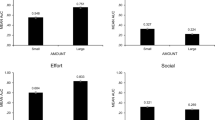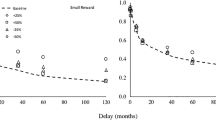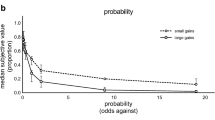Abstract
Probability discounting is loss in reinforcer value as a function of uncertainty. In typical tasks measuring probability discounting, participants repeatedly choose between a smaller, certain amount and a larger amount at one of several probabilities, and do not experience the outcome they select. Most participants show a gain–loss asymmetry, discounting gains more steeply than losses. We examined whether gain–loss asymmetry also occurred when participants received feedback about the number of points they had gained or lost following choices, and whether discounting rates changed as participants accrued experience of outcomes across the session. We assessed discounting of hypothetical monetary gains and losses twice using a mixed description-experience task. In these tasks, participants chose repeatedly between options that were described, where each choice was then followed by feedback on the number of points gained or lost from the chosen option, but not the unchosen option (i.e. a partial feedback procedure). Neither the first nor second task showed a consistent mean difference in discounting of gains and losses. Discounting in the first task was affected by an interaction of condition order and type of outcome (gains or losses). Furthermore, discounting of losses was more stable across task administrations than discounting of gains. Participants’ tendency to choose the probabilistic option was significantly correlated across conditions. Together, this highlights the crucial role of recent experience of outcomes on probability discounting of gains and losses.


Similar content being viewed by others
References
Barron, G., & Erev, I. (2003). Small feedback-based decisions and their limited correspondence to description-based decisions. Journal of Behavioural Decision Making, 16, 215–233. https://doi.org/10.1002/bdm.443.
Barron, G., Leider, S., & Stack, J. (2008). The effect of safe experience on a warnings' impact: Sex, drugs, and rock-n-roll. Organizational Behavior & Human Decision Processes, 106, 125–142. https://doi.org/10.1016/j.obhdp.2007.11.002.
Baucells, M., & Villasis, A. (2010). Stability of risk preferences and the reflection effect of prospect theory. Theory & Decision, 68, 193–211. https://doi.org/10.1007/s11238-009-9153-3.
Baum, W. M. (2004). Molar and molecular views of choice. Behavioural Processes, 66, 349–359. https://doi.org/10.1016/j.beproc.2004.03.013.
Blampied, N. M. (2017). Analysing therapeutic change using modified Brinley plots: History, construction, and interpretation. Behaviour Therapy, 48, 115–127. https://doi.org/10.1016/j.beth.2016.09.002.
Dai, Z., Grace, R. C., & Kemp, S. (2009). Reward contrast in delay and probability discounting. Learning & Behaviour, 37, 281–288. https://doi.org/10.3758/LB.37.3.281.
Estle, S. J., Green, L., Myerson, J., & Holt, D. D. (2006). Differential effects of amount on temporal and probability discounting of gains and losses. Memory & Cognition, 34, 914–928. https://doi.org/10.3758/BF03193437.
Fantino, E., & Navarro, A. (2012). Description-experience gaps: Assessments in other choice paradigms. Journal of Behavioral Decision Making, 25, 303–314. https://doi.org/10.1002/bdm.737.
Glöckner, A., Hilbig, B. E., Henninger, F., & Fiedler, S. (2016). The reversed description-experience gap: Disentangling sources of presentation format effects in risky choice. Journal of Experimental Psychology: General, 145, 486–508. https://doi.org/10.1037/a0040103.
Green, L., Myerson, J., Oliveira, L., & Chang, S. E. (2014). Discounting of delayed and probabilistic losses over a wide range of amounts. Journal of the Experimental Analysis of Behavior, 101, 186–200. https://doi.org/10.1901/jeab.2014.101-186.
Greenhow, A. K., Hunt, M. J., Macaskill, A. C., & Harper, D. N. (2015). The effect of reinforcer magnitude on probability and delay discounting of experienced outcomes in a computer game task in humans. Journal of the Experimental Analysis of Behavior, 104, 186–197. https://doi.org/10.1002/jeab.166.
Hertwig, R., Barron, G., Weber, E. U., & Erev, I. (2004). Decisions from experience and the effect of rare events in risky choice. Psychological Science, 15, 534–539. https://doi.org/10.1111/j.0956-7976.2004.00715.x.
Hertwig, R., & Erev, I. (2009). The description-experience gap in risky choice. Trends in Cognitive Sciences, 13, 517–523. https://doi.org/10.1016/j.tics.2009.09.004.
Hinvest, N. S., & Anderson, I. M. (2010). The effects of real versus hypothetical reward on delay and probability discounting. The Quarterly Journal of Experimental Psychology, 63, 1072–1084. https://doi.org/10.1080/17470210903276350.
Jessup, R. K., Bishara, A. J., & Busemeyer, J. R. (2008). Feedback produces divergence from prospect theory in descriptive choice. Psychological Science, 19, 1015–1022. https://doi.org/10.1111/j.1467-9280.2008.02193.x.
Johnson, M. W., & Bickel, W. K. (2008). An algorithm for identifying nonsystematic delay discounting data. Experimental and Clinical Psychopharmacology, 16, 264–274. https://doi.org/10.1037/1064-1297.16.3.264.
Kahneman, D., & Tversky, A. (1979). Prospect theory: An analysis of decision under risk. Econometrica, 47, 263–291. https://doi.org/10.2307/1914185.
Lejarraga, T., & Gonzalez, C. (2011). Effects of feedback and complexity on repeated decisions from description. Organizational Behaviour & Human Decision Processes, 116, 286–295. https://doi.org/10.1016/j.obhdp.2011.05.001.
Lejarraga, T., & Müller-Trede, J. (2016). When experience meets description: how dyads integrate experiential and descriptive information in risky decisions. Management Science, 63, 1953–1971. https://doi.org/10.1287/mnsc.2016.2428.
Ludvig, E. A., Madan, C. R., & Spetch, M. L. (2014). Extreme outcomes sway risky decisions from experience. Journal of Behavioural Decision Making, 27, 146–156. https://doi.org/10.1002/bdm.1792.
Ludvig, E. A., & Spetch, M. L. (2011). Of black swans and tossed coins: Is the description-experience gap in risky choice limited to rare events? PLoS ONE, 6, e20262. https://doi.org/10.1371/journal.pone.0020262.
Matusiewicz, A. K., Carter, A. E., Landes, R. D., & Yi, R. (2013). Statistical equivalence and test-retest reliability of delay and probability discounting using real and hypothetical rewards. Behavioural Processes, 100, 116–122. https://doi.org/10.1016/j.beproc.2013.07.019.
Mazur, J. E. (1987). An adjusting procedure for studying delayed reinforcement. In M. L. Commons, J. E. Mazur, J. A. Nevin, & H. Rachlin (Eds.), Quantitative analyses of behaviour: Vol. 5. The effect of delay and of intervening events on reinforcement value (pp. 55–73). Hillsdale, NJ: Lawrence Erlbaum Associates.
Mitchell, S. H., & Wilson, V. B. (2010). The subjective value of delayed and probabilistic outcomes: Outcome size matters for gains but not for losses. Behavioural Processes, 83, 36–40. https://doi.org/10.1016/j.beproc.2009.09.003.
Rachlin, H., Raineri, A., & Cross, D. (1991). Subjective probability and delay. Journal of the Experimental Analysis of Behavior, 55, 233–244. https://doi.org/10.1901/jeab.1991.55-233.
Rasmussen, E. B., Lawyer, S. R., & Reilly, W. (2010). Percent body fat is related to delay and probability discounting for food in humans. Behavioural Processes, 83, 23–30. https://doi.org/10.1016/j.beproc.2009.09.001.
Richards, J. B., Mitchell, S. H., de Wit, H., & Seiden, L. S. (1997). Determination of discount functions in rats with an adjusting-amount procedure. Journal of the Experimental Analysis of Behavior, 67, 353–366. https://doi.org/10.1901/jeab.1997.67-353.
Scheres, A., Dijkstra, M., Ainslie, E., Balkan, J., Reynolds, B., Sonuga-Barke, E., & Castellanos, F. X. (2006). Temporal and probabilistic discounting of rewards in children and adolescents: Effects of age and ADHD symptoms. Neuropsychologia, 44, 2092–2103. https://doi.org/10.1016/j.neuropsychologia.2005.10.012.
Shead, N. W., & Hodgins, D. C. (2009). Probability discounting of gains and losses: Implications for risk attitudes and impulsivity. Journal of the Experimental Analysis of Behavior, 92, 1–16. https://doi.org/10.1901/jeab.2009.92-1.
Shlomi, Y. (2014). Subjective integration of probabilistic information from experience and description. Judgment & Decision Making, 9, 491–499 Retrieved from http://hdl.handle.net/1903/9922.
Tversky, A., & Kahneman, D. (1992). Advances in prospect theory: Cumulative representation of uncertainty. Journal of Risk & Uncertainty, 5, 297–323. https://doi.org/10.1007/BF00122574.
Weatherly, J. N., & Derenne, A. (2013). Probability and delay discounting of gains and losses using the multiple-choice method. The Psychological Record, 63, 563–582. https://doi.org/10.11133/j.tpr.2013.63.3.011.
Wulff, D. U., Mergenthaler-Canseco, M., & Hertwig, R. (2018). A meta-analytic review of two modes of learning and the description-experience gap. Psychological Bulletin, 144, 140–176. https://doi.org/10.1037/bul000011.
Author information
Authors and Affiliations
Corresponding author
Ethics declarations
Declarations of potential conflicts of interest
On behalf of all authors, the corresponding author states that there is no conflict of interest.
Ethical approval
All procedures performed in studies involving human participants were in accordance with the ethical standards of the institutional and/or national research committee and with the 1964 Helsinki declaration and its later amendments or comparable ethical standards
Informed consent
Informed consent was obtained from all individual participants included in the study.
Funding
This research did not receive any specific grant from funding agencies in the public, commercial, or not-for-profit sectors.
Data availability
The datasets analyzed during the current study are available from the corresponding author on reasonable request.
Additional information
Publisher’s Note
Springer Nature remains neutral with regard to jurisdictional claims in published maps and institutional affiliations.
Rights and permissions
About this article
Cite this article
Asgarova, R., Macaskill, A.C. & Hunt, M.J. Gain–Loss Asymmetry in Experiential Probability Discounting. Psychol Rec 70, 359–371 (2020). https://doi.org/10.1007/s40732-020-00379-1
Published:
Issue Date:
DOI: https://doi.org/10.1007/s40732-020-00379-1




